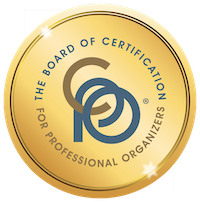Worth repeating: Working with a professional organizer
Back in 2011, I wrote a blog post aimed at helping those of you who might be interested in working with a professional organizer make the most out of the experience. I asked other professional organizers to comment, which made the post even more valuable. I re-read it the other day and thought it would be worth running again. To get the maximum benefit, go back to the original post and read those comments.
If you’re reading an organizing blog, chances are pretty good that you fall into one of three camps:
- You’re a professional organizer (or an aspiring one)
- You’d like to work with a professional organizer
- You’re a fairly organized DIYer looking for ideas
This post is for those of you who fall into the second category. If you’d like to work with a professional organizer, I’d love to provide you with some advice to optimize that experience, should it come to pass.
Choosing an organizer
- Check out your choices thoroughly. You can find professional organizers at the website of National Association of Productivity and Organizing Professionals and the Institute for Challenging Disorganization. If you’re in St. Louis, you can go to the NAPO-St. Louis website to see all the chapter members. (If you’re not in St. Louis, you can check here to see a list of NAPO chapters and their websites.) Choose some local organizers and read websites, look at testimonials and before and after pictures. Call any organizers you’re interested in who don’t have websites.
- Ask around. If you know folks who have worked with organizers, quiz them on their experience
- Know what you’re looking for. Do you want an organizer who tells you what to do (some people do)? Or one who involves you in the process of coming up with solutions?
- Trust your gut. If an organizer’s website or telephone manner resonates with you, that’s a good reason to pick her (or him).
- Don’t bargain shop. This is a field where fees are usually commensurate with training and experience. If you’re challenged by chronic disorganization, for example, you’d be wise to select an organizer with training and experience in working with chronically disorganized clients. And you may well pay more for that.
Working with an organizer
- Resist the temptation to clean up for your organizer. If your home is messy, you may feel embarrassed. Try to set that aside so that the organizer can see the natural state of your home in order to help you best. Mess and piles can provide clues.
- Be honest. Try not to anticipate what the organizer wants to hear. Instead, just answer all questions honestly, even if you’re a little embarrassed. Your organizer can help you best if you’re honest in everything you tell her.
- Be realistic. How long have you been dealing with disorder in your life? Probably quite some time. Unfortunately, organizers don’t have magic wands, so we can’t fix things instantly. Recognize that this is a process that might take awhile.
- Be prepared to learn new behaviors. If you’re dealing with a lot of clutter, the first step might be decluttering. But after that, you’re more than likely going to need to change your habits and create new routines to ensure that the clutter doesn’t come back. If you don’t change your behavior, the order that you and your organizer create might be temporary.
- Do your homework. If you and your organizer agree that you’ll do homework, try to accomplish it. If you don’t it’s usually not a big deal. But being honest and realistic about the prospect of what you can accomplish between appointments can help your organizer better plan the next session.
- Trust your gut (again). If you’re not clicking with your organizer, don’t be afraid to talk with her about it. This is intimate work and it’s essential that you have a trusting relationship and work well together. If you don’t feel it’s working with the organizer, perhaps the two of you can come up with a solution. If no solution is in sight, perhaps you can ask her for a referral.
- Keep your appointments. If you book an appointment with an organizer, try to keep that commitment. She’s set aside time for you and scheduled around that appointment. Last-minute cancellations can be costly for the organizer. And they’re costly for you, too, since you can’t get help if you don’t keep appointments.
- Expect backsliding. Most clients experience some backsliding, when life gets in the way and newly learned behaviors fall by the wayside. If you backslide, it doesn’t mean you’ve failed or your organizer isn’t effective. It just means you need to renew your efforts. Or perhaps tweak our systems.
- Be brave. It can be scary to let someone into your house for the first time in ages. It can also be scary to admit to your organizer that you haven’t done your homework or that you’ve not been able to maintain the order you created together. But organizers, by and large, are compassionate and non-judgmental people. Getting past the fear can help put you on the path to an orderly life.
When you hire a professional organizer, you’re making a time and financial commitment to getting organized. Often, you’re making an emotional commitment as well. That can be very powerful!
Do you have anything to add? I’d love to hear from POs or people who have worked with POs who would like to add to this list.
Tagged with: decluttering, professional organizer, worth repeating
Comments
Links
- Peace of Mind Spending
- Are you interested in becoming a professional organizer?
- Institute for Challenging Disorganization
- Shannon Wilkinson, life coach
- Organize Your Family History
- Getting to Good Enough podcast
- Ravelry
- NAPO St. Louis
- National Association of Productivity and Organizing Professionals








